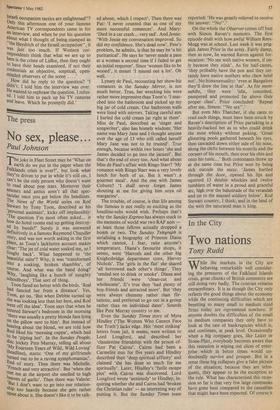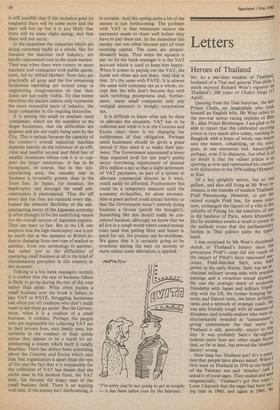In the City
Two nations
Tony Rudd
while the markets in the City are behaving remarkably well consider- ing the pressures of the Falkland Islands crisis, great chunks of British commerce are still doing very badly. The contrast remains extraordinary. It is as though the City only reflects the good things about the economy while the continuing difficulties which are besetting so many small to medium sized firms today are represented nowhere. If anyone doubts the difficulties of the small to medium companies they only have to look at the rate of bankruptcies which is, and continues, at peak level. Occasionally when a big company goes, like Laker or Stone-Platt, everybody becomes aware that this recession is wiping out slices of enter- prise which in better times would un- doubtedly survive and prosper. But in a sense these big collapses give a false picture of the situation; because they are infre- quent, they appear to be the exception to the rule. What has characterised this reces- sion so far is that very few large companies have gone bust compared to the casualties that might have been expected. Of course it
is still possible that if the recession goes on unabated there will be some more and the pace will hot up but it is just likely that there will be some slight easing, and that these will not occur.
In the meantime the industries which are doing extremely badly as a whole, like for instance the machine tool industry, are hardly represented now in the stock market. Time was when there were twenty or more machine tool companies "with public quota- tions, led by Alfred Herbert. Now they are practically all gone and the few remaining businesses operating are tucked away in engineering conglomerates so that their losses are not really visible. To that extent therefore the market indices only represents the more successful parts of industry, the large companies in the ongoing industries.
It is among the small to medium sized companies, which are the suppliers to the larger businesses, that the difficulties are greatest and are not really being seen by the City. This is serious because the capacity of the country's overall industrial machine depends heavily on the existence of an effi- cient and healthy second and third line of smaller businesses whose role it is to sup- port the larger enterprises. It has to be recognised, of course, that in this sub- contracting area, the casualty rate in business is invariably greater than in the front line: In Japan, for instance, the bankruptcy rate amongst the small sub- contractors is phenomenal. They die off every day but they are replaced every day. Indeed the inherent flexibility of the sub- contracting sector of the Japanese economy is often thought to be the underlying reason for the overall success of Japanese exports. They can react so fast. But in the UK one suspects that the high bankruptcy rate is not so much due at the moment to British in- dustry changing from one type of market to another, from one technology to another, but rather just to the difficulties of operating small business at all in the kind of circumstances prevalent in this country at the moment.
Talking to a few bank managers recently it is evident that the rate of business failure is likely to go up during the rest of this year rather than abate. What often pushes a small business over the brink is failure to pay VAT or PAYE. Struggling businesses can often put off creditors who don't really want to see them go under. But the Govern- ment, when it is a creditor of a small business, is ruthless. Perhaps the people who are responsible for collecting VAT are in their private lives, nice family men, but certainly in the conduct of their public duties they appear to be a harsh lot ad- ministering a system which itself is totally heartless. There has always been something about the Customs and Excise which said that that organisation is apart from the rest of life and the fact that it is responsible for the collection of VAT has meant that the excise man in his modern form, the VAT man, has become the bogey man of the small business field. There is no arguing with him. If the money isn't forthcoming, it is curtains. And this spring quite a lot of the money is not forthcoming. The problem with VAT is that businesses receive the payments made to them well before they have to pay them out. In the meantime this money can too often become part of their working capital. The sums are propor- tionately large. Thus when the squeeze is put on by the bank manager it is the VAT account which is used to keep him happy. When it comes to paying out the VAT, the funds too often are not there. And that is that. It's the same with PAYE. It is almost the same with company tax as a whole, ex- cept that the bills don't become due with such terrifying promptness and, further- more, many small companies only pay vestigial amounts in straight corporation tax.
It is difficult to know what can be done to alleviate the situation. VAT has to be collected and while it is in the Customs and Excise court there is no changing the ruthlessness of that obligation. Perhaps small businesses should be given a grace period if they need it to make their pay- ment. The Government announced a lower than expected level for last year's public sector borrowing requirement of around £83.4 million a day so that a slight deferment of VAT payments, as part of a system to alleviate commercial distress as it were, could easily be afforded. Furthermore this could be a temporary measure until the economy re-liquifies, let alone recovers. Also a grace period could attract interest so that the Government wasn't entirely doing business a favour (perish the thought!). Something like this should really be con- sidered because, although we know that we all live in a tough world where sound money rules (and that getting fitter and leaner is good for us), the process can be overdone. We guess that it is certainly going to be overdone during the next six months or more unless some alleviation is applied.
'Int sorry you're not going to get in tonight — it has been taken over by the Marines.'







































 Previous page
Previous page